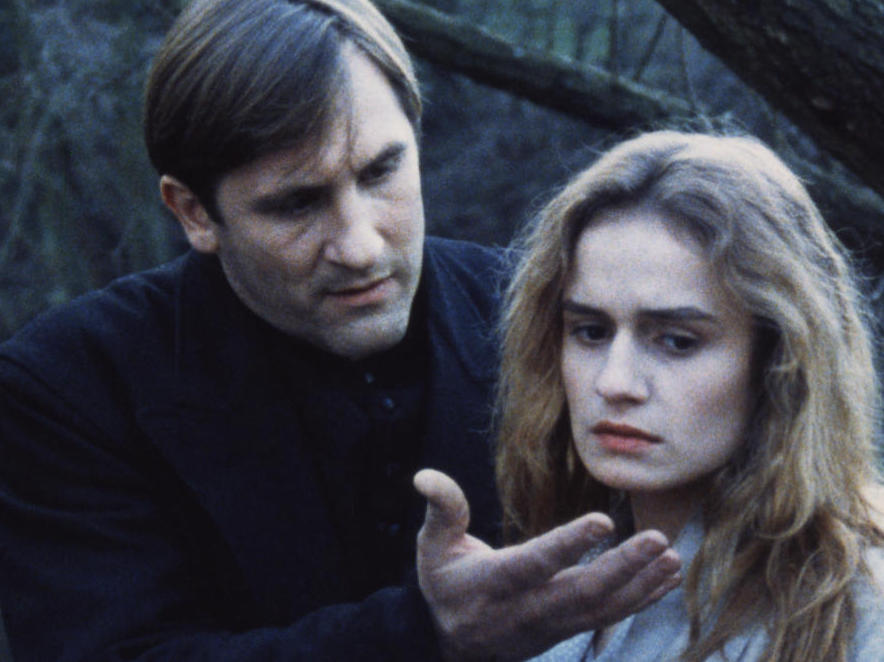
Meditation on faith, holiness and the nature of evil. A paradoxically austere adaptation of the first (wild and feverish) novel by Bernanos, with Depardieu in the role of the ascetic Donissan. Palme d’Or at Cannes, where it met with boos and derision. Pialat’s response? “If you don’t like me, I can tell you that I don’t like you, either.”
EN
“Under the Sun of Satan is an extraordinary film, a religious drama with a carnal ferocity. Whereas Bresson’s naturalistic religion condenses a vast force into an infinitesimal gesture, Pialat expands spiritual power to a large-scale struggle that bursts out in physical and emotional violence. Depardieu plays Donissan, a priest whose intense physical self-punishment is rendered all the more terrifying by the actor’s manifest physical strength and appetites. The fury of Donissan’s religious devotion, an utterly non-amiable, relentless quest for Christian suffering, alienates his parishioners even as he seems to sense the presence of the Devil more clearly than that of God. Pialat is an obstinately worldly director who films a miracle as he’d film a bad romance, a shattered family, or a criminal plot, as a brute fact that unleashes its energy without winning his assent. He casts himself as Donissan’s superior, and reveals onscreen his power over Depardieu, as well as his utter admiration for the wild inspiration of actor and character alike.”
Richard Brody1
“Under the Sun of Satan was another eyebrow-raising departure for Pialat after Police, regardless of Pialat’s outspoken reverence for writer Georges Bernanos. (Robert Bresson, one of the few masters Pialat truly revered, had also adapted Bernanos in Diary of a Country Priest.) After all, what could Pialat possibly expect to do with this hallowed literary material—a story of God and the Devil, whose metaphysical dimensions were worlds away from his usual earthly concerns – which could place it in the register of À nos amours or Naked Childhood? As it happened, the pressure of the text would engender a chaos and a paranoia all its own. On one occasion, producer Daniel Toscan du Plantier arrived on set to find the cast and crew effectively held hostage, as Pialat had locked himself in a room and forbidden anyone to leave: his door was forced open and he was dragged out. As always, Pialat had made his actors and crew suffer, but also, on this occasion, himself. The sacrifice made by Depardieu’s priest, Donissan, in the service of the salvation of a young girl, Mouchette (Bonnaire), was being mirrored in the sacrifice Pialat was making of his own health, for the good of the film. As a matter of record, he had decided to make the film because he saw in it an opportunity to win the Palme d’or at Cannes, which he duly received, under a rain of catcalls and whistles. Stung by this cruel reception, he addressed the crowd: ‘You may not like me. But you need to know that I do not like you,’ and raised his fist in defiance.”
Julien Allen2
“Maurice Pialat was one of the toughest, most bullish, tenderhearted, pugnacious filmmakers to ever work in Europe. He made 10 feature films, many shorts, and one television series in 35 years. Each is uncommonly spare, love-filled, banal, and brutal, as difficult to experience as their maker reportedly was to contend with on set. Together they form an oeuvre that exemplifies rigor and gracelessness and a total lack of fussiness about good taste, wherever it might land on the high-low spectrum. His movies are routine and explosive; they lurch between emotional polarities in the space of a minute; they are stuffed with odd-ends and anti-climaxes. His actors flip wildly between dramatic registers and the characters they play are thrown together out of flagrantly contradictory material. His work is riven with ellipses, regularly shifting uncomfortably, seismically past essential plot points and character beats – he was said to cut instinctively chasing the ‘truth’ of a given scene. None of which is to say that Pialat was ever imprecise; he was simply scrupulous – pig-headed even – in following a well-developed, natural bullshit detector.”
Christopher Small & James Corning3
- 1Richard Brody, “Booed at Cannes,” The New Yorker, 7 May 2013.
- 2Julien Allen, “Maurice Pialat: Moments of Truth,” 16 October 2015.
- 3Christopher Small, James Corning, “Video Essay. Pialat: Tough Love,” MUBI Notebook, 18 September 2017.

